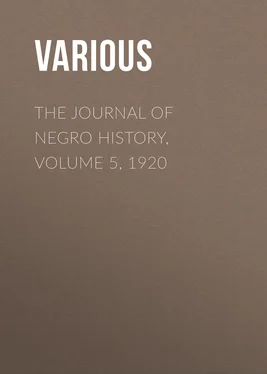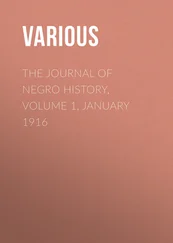Various - The Journal of Negro History, Volume 5, 1920
Здесь есть возможность читать онлайн «Various - The Journal of Negro History, Volume 5, 1920» — ознакомительный отрывок электронной книги совершенно бесплатно, а после прочтения отрывка купить полную версию. В некоторых случаях можно слушать аудио, скачать через торрент в формате fb2 и присутствует краткое содержание. Жанр: foreign_antique, periodic, История, foreign_edu, на английском языке. Описание произведения, (предисловие) а так же отзывы посетителей доступны на портале библиотеки ЛибКат.
- Название:The Journal of Negro History, Volume 5, 1920
- Автор:
- Жанр:
- Год:неизвестен
- ISBN:нет данных
- Рейтинг книги:4 / 5. Голосов: 1
-
Избранное:Добавить в избранное
- Отзывы:
-
Ваша оценка:
- 80
- 1
- 2
- 3
- 4
- 5
The Journal of Negro History, Volume 5, 1920: краткое содержание, описание и аннотация
Предлагаем к чтению аннотацию, описание, краткое содержание или предисловие (зависит от того, что написал сам автор книги «The Journal of Negro History, Volume 5, 1920»). Если вы не нашли необходимую информацию о книге — напишите в комментариях, мы постараемся отыскать её.
The Journal of Negro History, Volume 5, 1920 — читать онлайн ознакомительный отрывок
Ниже представлен текст книги, разбитый по страницам. Система сохранения места последней прочитанной страницы, позволяет с удобством читать онлайн бесплатно книгу «The Journal of Negro History, Volume 5, 1920», без необходимости каждый раз заново искать на чём Вы остановились. Поставьте закладку, и сможете в любой момент перейти на страницу, на которой закончили чтение.
Интервал:
Закладка:
The Democrats then organized the Senate and House of Representatives, and in joint session elected Gen. M. C. Butler, U. S. Senator. D. T. Corbin, who received the Republican votes, contested, but the Senate which was Republican by a small majority seated Butler. Senators Don Cameron from Pennsylvania and John J. Patterson from South Carolina, both Republicans, voted for Butler.
That there was no one killed or injured while the contest was going on is remarkable when the great excitement during and after the "Red Shirt" campaign is considered. It shows what absolute control the gubernational candidates had over their followers. No doubt the Democrats, who were assured that the U. S. soldiers would be withdrawn, did not care to make a slip as Chamberlin was still governor and the troops were practically under his orders.
Thus ended the Reconstruction Period in South Carolina.
At every step the Republican Party in South Carolina was betrayed by Republicans.
Col. T. W. Parmele, white. Superintendent of the Penitentiary, appointed as a Republican by Gov. Chamberlin, recognized an order from Gen. Hampton for the pardon of a convict. Legal complications ensued and the case was carried before Associate Justice Willard, white, of the Supreme Court, a Republican elected by the legislature, and he decided in favor of Hampton.
Three colored members of the legislature deserted to the Democrats, which practically made the House Democratic.
Col. Parmele and Justice Willard were Northern white men.
This paper would not be complete without some reference to the prominent colored men who helped to make history during that eventful period.
Robert Brown Elliott—
Born at Boston, Mass., August 11, 1842.
Entered High Holborn Academy, London, England, 1853.
Entered Eton College, 1855 and graduated in 1859. Studied law.
Member of the State Constitutional Convention.
Member of the House of Representatives of South Carolina, 1868-1870.
Assistant Adjutant General.
Elected to the 42nd Congress.
Resigned his seat in Congress and was elected to the House of Representatives of S.C. for the second time, and was elected Speaker of the House.
He came within a few votes of being elected U. S. Senator in 1874, but the powerful influence of the Pennsylvania R. R. Co., was exerted in behalf of John J. Patterson, white, the successful candidate. There was a colored majority in both branches of the legislature at the time and had the colored members so desired they could have elected Gen. Elliott.
In 1876 Gen. Elliott was the nominee on the Republican ticket for Attorney General and was elected but was forced to withdraw with the rest of the ticket.
He was Chairman of the State Republican Committee during the campaign of 1876.
For scholarly attainments, legal acumen, political sagacity and oratorical power, Robert Brown Elliott stands out as the most brilliant figure of the Reconstruction Period.
Joseph H. Rainey—
Born at Georgetown, S.C., June 21, 1832.
Although debarred by law from attending school he acquired a good education and further improved his mind by observation and travel.
He was a barber by trade and followed that occupation at Charleston, S.C., until 1862, when having been forced to work upon the fortifications of the Confederates he escaped to the West Indies, where he remained until the close of the war, when he returned to his native town.
Delegate to the State Constitutional Convention.
State Senator from Georgetown County.
Elected to the 41st Congress, being the first colored man having that distinction, and was re-elected to the 42nd, 43rd, 44th and 45th Congresses, five successive terms, the only colored man with such a record.
He received a caucus nomination as Clerk of the House, from the Republican members of Congress, the only colored man who has ever been honored by a Republican caucus.
The House was Democratic.
He was a delegate to several National Republican Conventions.
Served as Special Agent for the Treasury Department.
Polished in his manners—a fluent and convincing speaker, he was prominent in the Councils of the Republican Party.
Gen. Robert Smalls—
Born in South Carolina, at Beaufort, April 5, 1839.
Although debarred by Statute from attending school, he educated himself with such limited advantages as he could secure.
Removed to Charleston, S.C., in 1851, worked as a rigger, leading a sea-faring life.
Employed on the Planter , a steamer plying in Charleston harbor as a transport, which he took over Charleston Bar in May, 1862, and delivered her and his services to the U. S. Blockading Squadron.
In recognition of his services was appointed Pilot in the U. S. Navy, and served in that capacity on the monitor "Koekuk."
Promoted as Captain for gallant and meritorious conduct, December 1, 1863, and placed in command of the Planter , serving until she was put out of commission in 1866.
Delegate to the State Constitutional Convention.
State Senator from Beaufort Co.
Elected to the 44th Congress, and re-elected to the 45th, 48th and 49th Congresses.
Was a delegate to every National Republican Convention up to within a short time of his death.
Collector of the Port of Beaufort, S. C.
Died two or three years ago, the last of the "Old Guard" in S. C.
Alonzo J. Ransier—
Born at Charleston, S.C., 1834.
Self educated. Employed as a shipping clerk in 1850 by leading merchant, who was tried for violation of law "in having a colored clerk" and fined one cent with costs.
Delegate to the State Constitutional Convention.
Member of the House of Representatives of S.C.
Elected Lieutenant Governor on ticket with Gov. R. K. Scott, in 1870.
President of Southern States Convention held at Columbia, S.C., in 1871.
Presidential Elector on Grant and Colfax ticket in 1868.
Delegate to National Republican Convention in 1872.
Elected to the 42 Congress.
A man singularly gifted with political farsightedness.
Robert C. DeLarge.
Born at Aiken, S.C., March 15, 1842.
Farmer—Self-educated.
Agent of the Freedmen's Bureau from May, 1867 to April, 1868.
Delegate to the State Constitutional Convention.
Member of the House of Representatives, 1860-1870.
One of the State Commissioners of the Sinking Fund.
Elected State Commissioner in 1870.
Elected to the 42d Congress.
Very prominent in the Party Councils.
Rev. R. H. Cain—
Born in Greenbrier Co., Va., April 12, 1825.
His father moved to Ohio in 1831 and settled in Gallipolis.
Entered the ministry at an early age and became a student at Wilberforce University in 1860 and remained there one year.
Removed to Brooklyn, N. Y., at the breaking out of the war where he discharged ministerial duties as pastor for four years.
Was sent by his church as a missionary to the Freedmen in South Carolina.
Delegate to the State Constitutional Convention.
State Senator from Charleston Co.
Elected to the 43d Congress, and re-elected to the 45th Congress.
Bishop in the African Methodist Church and a power in that denomination.
William Beverly Nash—
Born in South Carolina.
Of limited education but endowed with wonderful common sense and political foresight.
Delegate to the State Constitutional Convention.
State Senator from Richland Co., in which Columbia is located.
For one term (four years) was Chairman of the Powerful Ways and Means Committee.
An elector on the Hayes and Wheeler ticket in 1876.
It was reported that he was offered $100,000 to vote for Tilden and Hendricks. Had he accepted the offer the Democratic ticket would have been elected, as the vote stood 186 for Hayes and 185 for Tilden. Be it said to his eternal honor he was beyond price.
Читать дальшеИнтервал:
Закладка:
Похожие книги на «The Journal of Negro History, Volume 5, 1920»
Представляем Вашему вниманию похожие книги на «The Journal of Negro History, Volume 5, 1920» списком для выбора. Мы отобрали схожую по названию и смыслу литературу в надежде предоставить читателям больше вариантов отыскать новые, интересные, ещё непрочитанные произведения.
Обсуждение, отзывы о книге «The Journal of Negro History, Volume 5, 1920» и просто собственные мнения читателей. Оставьте ваши комментарии, напишите, что Вы думаете о произведении, его смысле или главных героях. Укажите что конкретно понравилось, а что нет, и почему Вы так считаете.












